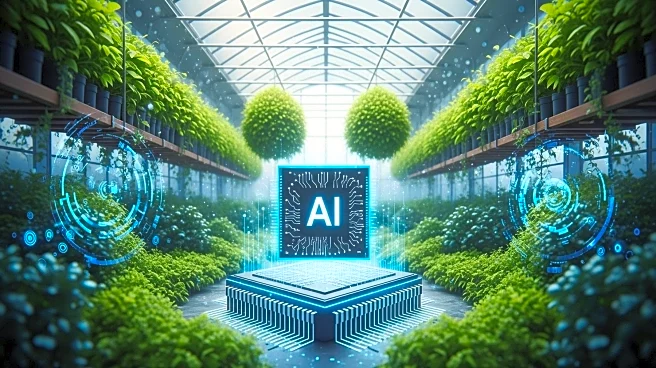What's Happening?
The Generative AI in Agriculture market is expected to witness substantial growth, with a projected compound annual growth rate (CAGR) of 25.02% from 2025 to 2030. This growth is driven by advancements in AI and machine learning technologies, which are increasingly being applied to optimize agricultural processes such as crop management, pest control, and resource optimization. Major players in the industry, including IBM, Microsoft, Google, and John Deere, are actively involved in developing AI-driven solutions to enhance precision agriculture and improve crop yields. The market is also seeing innovations in farm equipment design, driven by AI algorithms, which aim to increase efficiency and sustainability in agricultural practices.
Why It's Important?
The growth of Generative AI in Agriculture is significant as it addresses the rising global food demand due to population growth. By optimizing agricultural practices, AI technologies can lead to higher yields and resource efficiency, which are crucial for meeting food security challenges. The involvement of major tech companies in this sector highlights the potential for technological advancements to transform traditional farming methods. This shift could benefit large-scale farms and small and medium enterprises by reducing costs and improving productivity. However, the high initial investment required for AI technologies may pose challenges for smaller farmers, potentially widening the gap between large and small agricultural operations.
What's Next?
As the Generative AI in Agriculture market continues to expand, stakeholders can expect further innovations in AI-driven agricultural solutions. The focus will likely be on improving data availability and quality to enhance the effectiveness of AI models. Additionally, efforts to address infrastructure limitations and data privacy concerns will be crucial for the widespread adoption of AI technologies in agriculture. The market is poised for growth in regions like North America and Asia Pacific, where technological infrastructure is more developed, offering opportunities for companies to expand their reach and impact.
Beyond the Headlines
The integration of AI in agriculture raises ethical and legal considerations, particularly regarding data privacy and the equitable distribution of technological benefits. As AI becomes more prevalent in farming, there may be cultural shifts in how agricultural practices are perceived and implemented, potentially leading to changes in employment patterns and rural economies. Long-term, the adoption of AI could contribute to more sustainable agricultural systems, reducing environmental impact and promoting resilience against climate change.








